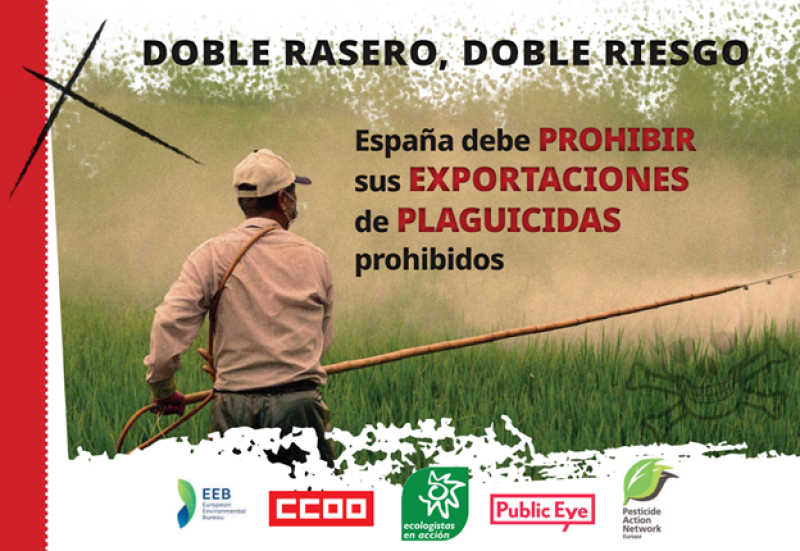Spain authorized the export of nearly 17,000 tons of substances harmful to people and the environment in 2023, mainly to the Global South. This is exposed in the new report ‘Double Standards, Double Risk’.
The report from Ecologistas en Acción, Public Eye, the trade union Comisiones Obreras, the EEB and PAN Europe highlights the double standard in pesticide regulation: while banning over 247 toxic substances within its borders, the EU allows companies to produce and export them to third countries.
The top exported pesticide substance was 1,3-dichloropropene (1,3-D), a soil fumigant used in fruit and vegetable cultivation. Despite being banned in the EU since 2007 and classified as a probable carcinogen by the U.S. Environmental Protection Agency, in 2023 Spain still shipped nearly 13,000 tons—mostly to the United States and Morocco. These two countries receive the most EU-banned pesticides from Spain, followed by Israel, Egypt, Ukraine, Senegal, Guatemala, Russia and Argentina, according to official data
Not very relevant for EU’s economy, but devastating in the Global South
The export of banned pesticides has devastating impacts on both human health and the environment in the Global South, constituting a violation of human rights. In these regions, pesticides are often sold in unlabeled plastic bags, sometimes mistaken for food packaging or used indoors to combat pests—without awareness of the dangers they pose to children playing on the floor. From September to November 2024, NGOs in Cameroon and South Africa have reported dozens of child deaths from poisoning by pesticides banned in the EU. Moreover, their use by farmers without any information or personal protective measures is estimated to cause 11,000 deaths from poisoning worldwide each year. [1]
However, ending these exports in the EU would not result in a major loss to the economy or threaten jobs, according to a report by civil society organisations, coordinated by PAN Europe. [2] In Spain’s specific case, only 10 companies are behind the export of banned pesticides from Spain, with Teleos Hispania SLU making up over 40% of the total volume and with less than 10 employees. Following closely are Agroquímicos del Levante, Tris Hispania SL, Bayer, and the American giant Corteva.
The most hazardous ones come back to our table
Hazardous pesticides banned in Europe still end up in European diets. Our report, Double Standards, Double Risk: Banned Pesticides in Europe’s Food Supply, revealed how many of these dangerous chemicals return as residues in imported food, exposing consumers to potential health risks. Meanwhile, EU farmers face an unfair competitive disadvantage with those in third countries that may still export to Europe food grown with these dangerous pesticides. [3]
In this new report, the second country to which Spain exported the harmful substance 1,3-D was Morocco, where it is mainly used in tomato cultivation and where most growers do not even use protective equipment, resulting in even higher exposures. It is worth noting that Spain is the European country that analyses EU-banned pesticides in imported food the least, as reported by Ecologistas en Acción, so the existing data on pesticide residues should be considered an underestimation.
EU should stop exporting banned pesticides
The EU must end double standards and immediately stop the export of pesticides that have been banned within Europe because of their health and environmental impacts. PAN Europe, alongside NGOs across Europe and beyond, has urged the Commissioner for Agriculture and Food to take action -both through an open letter and during the Pesticide Action Week with a demonstration in front of the European Commission [4] [5]. One clear demand was to stop importing food grown with these toxic pesticides.
The organizations behind this report call on Spain to also stop importing food containing pesticide residues prohibited in the EU. They specifically urge Spain to reject setting maximum residue limits above the established detection level for pesticides in imported food (i.e. it shouldn’t allow any such pesticides to be detected) and to strengthen customs controls and monitoring. These measures are essential to protect consumer health and ensure fair competition for farmers.
- Report: Doble rasero, doble riesgo (Double standards, double risk), Ecologistas en Acción, Comisiones Obreras, PAN Europe, EEB and Public Eye, March 2024
- Campaign: Stop export of EU banned pesticides
Notes:
[1] The global distribution of acute unintentional pesticide poisoning: estimations based on a systematic review, BMC Public Health, 2020
[2] EU pesticides export ban: what could be the consequences?, NGO coalition, April 2024
[3] Report: Double Standards, Double Risk: Banned Pesticides in Europe’s Food Supply
[4] Letter to Commissioner Hanser on Food double standards
[5] Action: Close Toxic Loopholes: Stop Hazardous Exports & Save Biodiversity!
